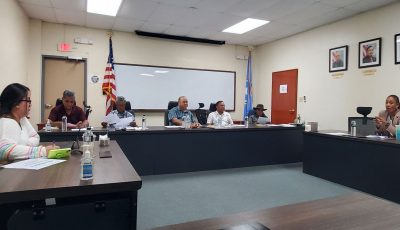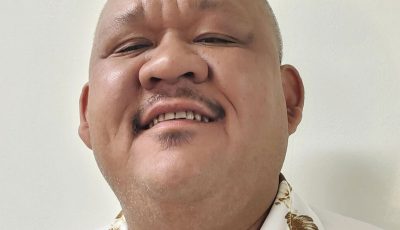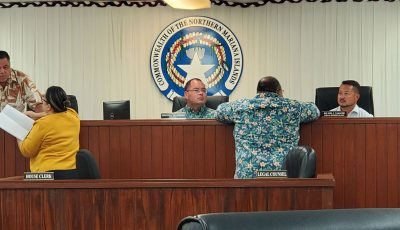Stand up for US workers
Editor’s Note: Delegate Gregorio Kilili C. Sablan (Ind-MP) submitted the following privileged statement for publication in the Congressional Record during the pro forma session of the U.S. House of Representatives on Aug. 14, 2018.
Mr. Speaker:
The recently announced decision to lay off “temporarily” hundreds of U.S. workers at the Imperial Pacific International casino construction site in the Northern Mariana Islands raises serious concerns about the use of foreign labor at this project. Pacific Rim, the contractor, announced the lay-off in July pending “contract renegotiations.” Meanwhile, work will go on, using foreign workers with H-2B visas to replace the U.S. workers.
Even half-finished, the Imperial Pacific International casino has lifted the economy of the Marianas. So, local news has focused on reassuring the public that work to complete the casino and its associated resort would continue. But these reassurances mean little to the U.S. workers who have lost their jobs, or to their families.
It also raises the question of why the U.S. Department of Labor, as it has reported to me, issued 1,668 foreign labor certifications to Imperial Pacific International to hire the H-2B visa holders, who are now taking the jobs of U.S. workers in apparent contravention of U.S. labor law.
Labor issued these foreign labor certifications to Imperial Pacific International despite the history of occupational safety and health and wage and hour violations that the department previously uncovered at this job site.
In May 2017, after a worker fell to his death and multiple other, serious workplace injuries were treated at the local hospital, the Occupational Safety and Health Administration proposed $193,750 in penalties for three of IPI’s construction subcontractors.
In March 2018, the department finalized settlements with IPI subcontractors of $13.9 million for unpaid wages and liquidated damages owed to over 2,400 employees.
In addition to these violations of the Occupational Safety and Health Act and the Fair Labor Standards Act, a raid of the site by the Federal Bureau of Investigation also revealed that the subcontractors had been unlawfully employing persons who were admitted to the United States from China as tourists.
This record in itself should have raised red flags at the U.S. Department of Labor. But the underlying purpose and process for foreign labor certification seems also in this case to have been subverted.
In order to obtain foreign labor certifications, which are a prerequisite to applying for an H-2B visa, an employer must attest that the job in question will be offered to any qualified and available U.S. worker who applies or is referred for the job opportunity. And in order to obtain an H-2B visa, an employer must attest that they have not laid off and will not lay off any similarly employed U.S. worker, unless the layoff is for lawful, job-related reasons and unless all H-2B workers are laid off first. The present lay-offs of U.S. workers, while work continues using H-2B workers, cannot be consistent with these employer attestations.
Let us look at the history of the Imperial Pacific International worksite:
In fiscal year 2016 the Marianas experienced a labor crisis, when the annual, numerical cap was reached for the Commonwealth Only Transitional Worker (CW) program. For the first time the Department of Homeland Security stopped accepting applications for this foreign labor program, unique to the Marianas. As the Government Accountability Office explained in a 2017 report commissioned by Senate Energy and Natural Resources Committee Chairman Lisa Murkowski, Ranking Member Maria Cantwell, and I:
Demand for foreign workers in the CNMI exceeded the available number of CW-1 permits in 2016—many approved for workers from China and workers in construction occupations. The construction of a new casino in Saipan is a key factor in this demand.
In fact, GAO reported, the demand for foreign workers jumped from 9,188 in 2014 to a number exceeding the 2016 cap of 13,299, almost entirely because of the demand for construction workers. The result was to crowd out established, local businesses, who employed CW workers and to force long-time foreign workers, who had demonstrated value to our economy and established roots in our community, to return home.
Not only was this crush of construction workers at the casino site economically and socially disruptive, it also did not jibe with the rules for the CW program. CW permits are only available to employers of foreign workers who are ineligible for any other U.S. work visa. Although some of the casino construction workers held CW permits (and some were employed illegally, having entered as tourists), we now know that these workers could well have received H-2B visas. Because, as the U.S. Department of Labor has reported, it issued 1,668 H-2B foreign labor certifications to IPI.
To end further abuse of the CW program and to protect the interests of local businesses in my district and their long-term workers and their families, I introduced legislation that, among other provisions, prohibited any further use of CW permits for new construction workers in the Marianas. Chairman Murkowski observed at her committee’s hearing on my bill, H.R. 339, that this bar on the use of CW permits for new construction workers was in her view the most important provision. Not only did it curb the abuse of the CW permit, but it was also meant to force the federal government to make the determination, through the foreign labor certification process, of whether U.S. workers were available for any construction jobs on offer. President Trump signed my bill into law in August 2017. It became U.S. Public Law 115-53.
IPI quickly responded to these new constraints by hiring Pacific Rim, a U.S.-based firm, to continue construction of the casino. And Pacific Rim president and owner Keith Stewart announced to the Guam Daily Post that he was looking to hire hundreds of skilled U.S. tradesmen for the work. Edward Deleon Guerrero, executive director of the Commonwealth Casino Commission, reacted positively to this news in an interview with KSPN-TV in January 2018.
Reporter: IPI is currently in contractual conversations with a new construction company, Pacific Rim, to finish the resort.
Guerrero: We are more confident when we are dealing with a U.S. construction company.
Reporter: IPI’s previous, Chinese-based construction companies brought in illegal construction workers and ultimately caused progress on the building to come to a standstill, once the FBI realized what was going on. Guerrero hopes to avoid, quote, ‘another fiasco like that from happening again.’
Guerrero: Definitely do not want to see a repeat of that.
Reporter: This time around, however, the work will be done with mostly U.S.-based workers.
Guerrero: It is my understanding that all, I mean, most, if not all of the workers, are U.S. construction workers.
In March, Pacific Rim held a job fair in Guam, which drew enthusiastic response from U.S. workers, who expressed a willingness to move to Saipan for new work opportunities and the chance to earn overtime and per diem, in addition to their regular pay. At the fair Pacific Rim general superintendent Tony Costa confirmed to the Post that his company wanted to have around 500 U.S. workers on the IPI site.
Marianas Gov. Ralph Torres even testified with pride before the Senate Energy and Natural Resources Committee on Feb. 16 of this year about the turnaround: “I’m proud to announce that because of learning of an issue that was experienced last year, we have signed U.S. contractors to finish the hotel of the casino that was signed, I believe, less than a month ago that will be hiring more U.S. workers to finish the construction of the hotel site.”
The governor also said IPI intended to complete construction by August 2018 and assured the committee that his administration was closely monitoring labor conditions at the site. It should be noted, too, that the original casino license agreement included the stated objective to have permanent U.S. residents be at least 65 percent of all employees—an objective that has not been met.
The governor’s testimony came at the hearing held to consider the Northern Mariana Islands U.S. Workforce Act, legislation that Chairman Murkowski and I had jointly introduced to incentivize the hiring of U.S. workers in the Marianas. President Trump signed the Act into law on July 24. Among other new protections for U.S. workers, Public Law 115-218 extends to the CW program the requirement for prior U.S. Department of Labor certifications, a stipulation the governor, the Marianas Legislature, and our business community all rightly agreed to.
Despite all these efforts and assurances to U.S. workers, however, at the same time IPI had begun the process of applying for foreign labor certifications from the U.S. Department of Labor with the intent to secure H-2B visas and hire foreign construction workers. Nominally, these foreign workers were to buttress, not replace Pacific Rim’s U.S. workforce. Instead, U.S. workers have now lost their jobs, replaced by foreign workers. Attestations to the U.S. Department of Labor that U.S. workers would not be laid off and replaced with foreign workers have not proven true. Assurances by the governor to keep watch on the Imperial Pacific job site seem hollow in light of recent events.
This must stop.
The people of the Northern Mariana Islands, whom I represent, are tired of having outside, foreign interests time after time give our islands a black eye by skirting the law, cutting corners on safety, playing fast and loose with the rules and thinking they can get away with it, beholden only to their bottom line and a handful of high-ranking local officials.
The U.S. Department of Labor, after enabling IPI by granting 1,668 foreign labor certifications, must take immediate action to step up enforcement and ensure IPI maintains absolute compliance with U.S. law.



























